- Overview
- Full Itinerary
- Photo Gallery
- Costing
- Travel Details
- Trip Reports
- Guide
- Map
- Know Before You Go
Join Naturalist Journeys on a NEW! journey into the heart of West Africa for a Ghana birding and nature safari—Ghana is a must-see destination for any birding and wildlife enthusiast. Ghana also has the most developed infrastructure of any West African country, making it an easy choice for travel. We work with a well-established birding company that supports conservation and they give us an in-depth glimpse into nature and its interface with rural culture. Travel with expert, professional, personable, friendly, and focused local guides—some of the finest in West Africa—and knowledgeable, experienced, and dedicated drivers. Peg Abbott, founder of Naturalist Journeys hosts this exciting tour.
Ghana has seven national parks and along the coast, five Ramsar wetland sites. We can expect to see a variety of iconic African mammals and birds alongside a fantastic array of exciting West African Upper Guinea endemic species. We begin in coastal wetlands and lagoons, then move inland through coastal savannah into the rich Upper Guinea Rainforests. Continuing northwards, we pass through broad-leaved Guinea Woodland and open savannah, finally touching the Sahel, a vast arid landscape below the Sahara to the north, on the Burkina Faso border.
Ghana’s biodiversity is notable and presents a contrast to more southern parts of the continent often visited on various safari routes. This Ghana safari is timed to pair well with our Southern Tanzania journey; indeed some of the group will be flying in from Dar Es Salaam.




Tour Highlights
- Enjoy time in tropical Africa; see birds of the African rainforest, coastal wetlands, savannah and the arid Sahel
- Find unique species of the Guiana-Congo biome, forest-dwelling birds of West and Central African
- At Kakum National Park, walk the span of one of only three canopy walkways in Africa; watch for raptors and forest species at eye-level
- Stay three nights at a comfortable forest lodge at Ankasa Reserve for incredible forest rare birds.
- Visit a Yellow-headed Picathartes nesting site and the local community that supports and is supported by tourism (this species occurs only in the rainforest of tropical west and central Africa)
- At Mole National Park, spend three nights at exquisite Zaina Lodge, known for incredible views
- Take safari drives to see birds and mammals at Ghana’s finest and largest protected area, Mole National Park, including African Elephant, Kob, Bushbuck, Waterbuck, Hartebeest, and Roan Antelope
- Have a chance to view and photograph the Egyptian Plover feeding along the White Volta River, a species recently placed in a family of its own.
- As a grand finale, walk slopes to reach the endangered habitat of Highland Upper Guinea Rainforest




Trip Itinerary
Itineraries are guidelines; variations in itinerary may occur to account for weather, road conditions, closures, etc. and to maximize your experience.
Sat., Oct. 7 : Welcome to Accra!
For those who arrive early, at least a night previous on October 6, we plan to organize an optional cultural day to get a peek at this bustling capital city today. Those flying direct may also opt to just relax at the hotel. Our tour officially starts this evening as we gather for dinner and a chance to get to know our guides and travel companions.
Accommodations at Erata Hotel, Accra (D)
Sun., Oct. 8 : Shai Hills Reserve | First Birding Near Tema
Today is an easy day, allowing us to acclimate to West Africa after our travels. Our local guide and driver meet us for an hour’s drive to our hotel close to the Shai Hills Reserve on the outskirts of Greater Accra. After checking in to our small hotel, we do some local birding, and our guide briefs us on the following days’ activities and answer any questions. Take a dip in the pool, a cold beverage and a relaxing evening meal.
Accommodations at Alexis Hotel, Tema (B,L,D)
Mon., Oct. 9 : Birding Shai Hills Reserve | Winneba Plains | Transfer to Kakum National Park
We depart early and head for the open grassland savannah of Shai Hills Reserve for a good selection of dry grassland birds along with baboons, antelope, and other wildlife. Then it’s on to the Sakamona Lagoon to scope a wide variety of water birds and wetland species. This is a coastal brackish lagoon with open water, floodplains, freshwater marsh, and coastal savannah grassland, and is a designated Ramsar wetland site of international importance.
After a wonderful morning, we set off towards Kakum National Park, stopping for lunch en route. On arrival, check in to relax in our lodge, home for the next three nights while we take time to explore this vast national park, enjoy our evening meal and reviewing our checklist for the day in preparation for an early start in the morning.
Accommodations at Rainforest Hotel, Jukwa (B,L,D)
Bird Highlights: Northern Crombec, Yellow-fronted Tinkerbird, Snowy-crowned Robin-Chat, African Pygmy Kingfisher, Cardinal Woodpecker, Vieillot’s and Double-toothed Barbets, Mocking Cliff-Chat, Rock Martin, Red-shouldered Cuckooshrike, Violet Turaco, Senegal Parrot, Senegal Batis, Blue-bellied Roller, Swallow-tailed Bee-eater, Oriole Warbler, Blackcap and Brown Babblers, Copper and Splendid Sunbirds, White Helmetshrike, Croaking and Siffling Cisticolas, African Thrush, Red-necked and Lizard Buzzards, Lanner Falcon, Green Woodhoopoe, Stone Partridge, Black-winged Stilt, Senegal Thick-knee, Common Ringed and Grey Plovers, Spur-Winged Lapwing, Black-tailed Godwit, Whimbrel, Common Greenshank, Spotted Redshank, Wood and Common Sandpipers, Collared Pratincole, Marsh and Curlew Sandpipers, Ruddy Turnstone, Little Stint, Long-tailed Cormorant, Squacco Heron, Gray, Purple, Striated, and Black Herons, Little, Cattle and Intermediate Egrets.
Tues., Oct. 10 : Kakum National Park & Canopy Walkways
Encompassing 145 square miles of tropical forest, Kakum National Park is unique in no small part because it was established at the initiative of the local people, rather than by the State Department of Wildlife, who are responsible for wildlife preservation in Ghana. It hosts some lush forests, and it is one of only three locations in Africa with a canopy walkway. Hosting one of the densest populations of forest elephants in Ghana, it is also rich in birds and butterflies.
After an early breakfast, we head for the national park, which is a quick 15 minute drive from our lodge. Aiming to arrive at first light, we spend the most critical bird viewing hours 40 meters above the forest floor on the world-famous 1,150-foot-long canopy walkway. With seven platforms large enough to support scopes, we comfortably scour the treetops for birds.
Kakum National Park protects secondary upper Guinea semi-deciduous tropical rainforest. It is a wonderful feeling to be eye to eye with the local birds including the Brown-cheeked Hornbill and Blue Cuckooshrike. Watch the skies for Congo Serpent-Eagle, African Harrier-Hawk, Cassin’s Hawk-Eagle, and more.
Return late morning to our lodge to refresh and enjoy lunch. During the heat of mid-afternoon, options include birding around the lodge and grounds, resting in air-conditioned rooms or around the pool and bar, or going on a cultural excursion to Cape Coast Castle.
We revisit the canopy walkway in the evening for other key species including Brown-cheeked, Black- and Yellow-casqued Hornbills, Great Blue Turaco, and Fraser’s Eagle-Owl among other specialties. We spend the evening at the lodge’s restaurant and bar, discussing the day’s sightings, adding to our checklist, and enjoying the atmosphere of our surroundings.
Accommodations at Rainforest Hotel, Jukwa (B,L,D)
Birding Highlights: Violet-backed Hyliota, Chestnut-capped Flycatcher, Sharpe’s Apalis, Brown-cheeked Hornbill, Long-tailed Glossy Starling, Bioko Batis, Blue Cuckooshrike, Little Green Woodpecker, White-crested Hornbill, Blue-throated Brown, Green, Collared, Johanna’s and Buff-throated Sunbirds, Red-headed and Crested Malimbes, Rosy Bee-eater, White-breasted and Gray-headed Nigrita, Red-fronted and Grey Parrots, Yellowbill, Western Black-headed and Black-winged Orioles, Rufous-crowned Eremomela, Splendid, Long-tailed Glossy, and Chestnut-winged Starlings, Preuss’s and Yellow-mantled Weavers, Green Hylia, Golden, Slender-billed, Little, and Grey Greenbuls, African Green-Pigeon, Yellow-billed Turaco, African Emerald Cuckoo, Blue-throated Roller, Yellow-throated, Red-rumped and Speckled Tinkerbirds, Hairy-breasted and Naked-faced Barbets, Ussher’s and Little Flycatchers, Cassin’s Honeyguide, African Pied Hornbill, Congo Serpent-Eagle, African Harrier-Hawk, Palm-nut Vulture, Cassin’s Hawk-Eagle, European Honey and Red-necked Buzzards, Long-tailed Hawk, Black Dwarf Hornbill, Yellow-footed Honeyguide and Black-collared Lovebird, Brown-cheeked, Black- and Yellow-casqued Hornbills, Great Blue Turaco, Brown Nightjar and Fraser’s Eagle-Owl.
Wed., Oct. 11 : Antwikwaa & Kakum National Park
We have another early start as we visit the Antwikwaa section of Kakum National Park, hoping to observe and watch the behavior of some amazing and colorful birds—four species of jewel-like bee-eaters, rollers, spinetails, weavers, sunbirds, and more.
We then go to a river site to scan for the beautiful White-bibbed (White-throated Blue) Swallow, Preuss’s Swallow, Rock Pratincole, White-headed Lapwing, and if we are lucky (which we sometimes are!) the grebe-like African Finfoot, often elusive under overhanging vegetation, may make an appearance. In the afternoon we concentrate our attention on the many forest trails within and surrounding the park, which should prove to be very productive.
Once again, we remain until dark trying for owls and nightjars that we may still wish to see before returning to our accommodation for a delightful dinner and to tally up our checklist.
Accommodations at Rainforest Hotel, Jukwa (B,L,D)
Birding Highlights: Little, White-throated, Rosy, and Black Bee-eaters, Blue-throated Roller, Piping Hornbill, Red-rumped Tinkerbird, White-spotted Flufftail, Cassin’s Spinetail, Sabine’s Spinetail, Dideric Cuckoo, Melancholy and Buff-spotted Woodpeckers, Vieillot’s Black and Black-necked Weavers, Kemps and Gray Longbills, Western Nicator, Western Bluebill, Olive-bellied, Superb, and Johanna’s Sunbirds, Copper-tailed, Longtailed Glossy, and Violet-backed Starlings, Northern Yellow White-eye, Bronze Mannikin, Orange-cheeked Waxbill, Yellow-billed Barbet, Forest Penduline-Tit, Ayre’s Hawk-Eagle, and Ahanta Spurfowl.
Thurs., Oct. 12 : Kakum Forest | Ankasa Reserve
This morning, we concentrate on exploring the farmland scrub, forest edge, and forest trails at Abrafo, a section of forest habitat near to Kakum National Park. Scan for cisticolas, barbets, sunbirds, wattle-eyes, greenbuls, and much more, including sought after species including Long-tailed Hawk, Chocolate-backed Kingfisher, Congo Serpent-Eagle, and Red-billed Dwarf and Black Dwarf Hornbills.
After lunch we check out of our lodge and set off westwards for a major highlight of our time in Ghana. Our destination is Ankasa Reserve, Ghana’s only wet evergreen rainforest, which is in near pristine condition. An exceptional forest in a remote location, Ankasa protects many rare and sought-after bird and mammal species.
There is a new lodge being built along the river on the boundary of this stunning rainforest; if this has not been completed prior to our tour then we have a choice of where to stay for the next three nights—either a local basic guesthouse 5 minutes’ drive to the forest or camping inside the forest itself. The tents are large with comfortable mattresses, pillows, and bed sheets. There are flushing toilets and cold private shower facilities a one-minute walk from our tents and our cook keeps us well fed three times a day, with cold beers and non-alcoholic beverages available. The camp is supplied with electricity and also has a backup generator if needed. And those who prefer not to camp, a nearby guesthouse is a comfortable alternative.
Arrive in the late afternoon and settle into our lodgings before heading out for early evening birding, where we hope to see Fraser’s and Akun Eagle-Owls, and the legendary Nkulengu Rail, first photographed in the wild in 2011. Spend the evening at either the guesthouse or campsite enjoying good food, cold drinks, and the atmosphere of being at one with nature.
Accommodations at Ankasa Reserve Lodge, Ankasa Reserve (B,L,D)
Birding Highlights: Pale Flycatcher, Black-and-white Mannikin, Brown-crowned Tchagra, Lowland Sooty Boubou, Puvel’s Illadopsis, Olive-green Camaroptera, Red-faced and Whistling Cisticolas, Lesser Striped Swallow, Fanti Saw-wing, Chestnut Wattle-eye, Naked-faced and Hairy-breasted Barbets, Fraser’s and Little Green Sunbirds, Bue Malkoha, Red-cheeked Wattle-eye, Swamp Greenbul, Northern Fiscal, Spotted Greenbul, Finsch’s Flycatcher-Thrush, Yellow-whiskered and Red-tailed Greenbuls, White-crested Hornbill, African Harrier-Hawk, Long-tailed Hawk, Red-billed Helmetshrike, Rufous-sided Broadbill, Chocolate-backed Kingfisher, Olive Long-tailed Cuckoo, Congo Serpent-Eagle, Red-billed Dwarf and Black Dwarf Hornbills, Fraser’s and Akun Eagle-Owls, and Nkulengu Rail
Fri., Oct. 13 & Sat., Oct. 14 : Birding Ankasa Reserve
Ankasa Reserve’s incredible forest protects so many rare and sought-after species that we dedicate three nights here. At over 500 square kilometers of continuous wet evergreen rainforest, Ankasa is biologically the most diverse rainforest in Ghana and one of the most diverse in West Africa. Protecting over 800 vascular plant species, almost 650 species of butterfly, in addition to Forest Elephant, Bongo, Diana Monkey, Chimpanzee, and several species of Pangolin and the most wanted West African bird species, Ankasa is a must-see destination.
Our guide is up before first light listening for the unmistakable call of the Nkulengu Rail, if he locates this species, he alerts the group before breakfast. Staying so close to a birding location is always a bonus as time is not wasted traveling.
After breakfast we set off venturing deeper into this lush forest with our main goal being the Upper Guinea endemics Yellow-bearded Greenbul, Rufous-winged Illadopsis, and Green-tailed Bristlebill in addition to other key forest species.
Our guide knows where the specialty species are found inside Ankasa and we have the best opportunity to see them. Driving in Land Rover 4x4s enables us to navigate the difficult forest roads ensures us that we get to these sites at the best time of day and permit us to bird remote trails around the pools where African Pitta are occasionally found. As we approach the watering holes located deeper inside the forest, we hope to see Western Crested Guineafowl on the road, while key birds include Hartlaub’s Duck, Dwarf Bittern, African Finfoot, and four species of kingfishers. Forest raptors are always welcome, and we hope to see Long-tailed Hawk and Congo Serpent-Eagle. There are some rare species here and if we are lucky, we may see White-breasted Guineafowl, White-crested Bittern, African Pitta, Gray-throated Rail, Dusky Long-tailed Cuckoo, Forest Scrub-Robin, Blue-moustached Bee-eater, Red-chested Owlet, and Akun Eagle-Owl.
We spend each evening enjoying good food and discussing the days birding over refreshments.
Accommodations at Ankasa Reserve Lodge, Ankasa Reserve (B,L,D)
Birding Highlights: Yellow-bearded Greenbul, Rufous-winged Illadopsis and Green-tailed Bristlebill in addition to Ansorge’s, Icterine, Red-tailed and Western Bearded- Greenbuls, Pale-breasted and Blackcap Illadopsis, Forest Scrub-Robin, White-tailed Ant-Thrush, White-tailed Alethe, Shining Drongo, Cassin’s Flycatcher, Yellow-spotted Barbet, White-throated Bee-eater, Chestnut-breasted Nigrita, Blue-headed Wood Dove, Western Bronze-naped Pigeon, Yellow-billed and Great Blue Turacos, Black-capped Apalis, Grey-headed Bristlebill, Tiny Sunbird and Red-fronted Antpecker, African Pitta, Western Crested Guineafowl, Hartlaub’s Duck, Dwarf Bittern, African Finfoot, Shining-blue, White-bellied, Blue-breasted and Dwarf Kingfishers, Long-tailed Hawk and Congo Serpent-Eagle, Crown Eagle, Square-tailed and Fanti Saw-wings, Black- and Yellow-casqued Hornbills, Black Dwarf and Piping Hornbills, White-breasted Guineafowl, White-crested Bittern, Gray-throated Rail, Dusky Long-tailed Cuckoo, Forest Scrub-Robin, Blue-moustached Bee-eater, Red-chested Owlet, Akun Eagle Owl
Sun., Oct. 15 : Ankasa Reserve & Brenu Akyinim
During a final morning’s birding at this wonderful location, we walk new forest trails in different parts of the forest and enjoy the exceptional biodiversity of this tropical habitat. Then, we head back for lunch and to freshen up before our departure to this seldom visited location.
Our vehicle loaded, we set off back towards Kakum National Park. During our journey we search for several species not seen in other parts of Ghana. These include Reichenbach’s and Mouse-Brown Sunbirds, White-browed Forest-Flycatcher, Orange Weaver, African Pygmy-Goose, Carmelite Sunbird, and Little Grebe to mention a few.
A visit to Brenu Akyinim and the coastal savannah plains gives us some new species to enjoy. Then we continue back towards Jukwa and a lodge we know to relax and reflect on another great day of exploring.
Accommodations at Rainforest Hotel, Jukwa (B,L,D)
Birding Highlights: Reichenbach’s and Brown Sunbirds, White-browed Forest-Flycatcher, Orange Weaver, African Pygmy Goose, Carmelite Sunbird, Little Grebe, Marsh Tchagra, Compact Weaver, Double-spurred Spurfowl, Oriole Warbler, Red-headed Quelea, Black-rumped Waxbill, Yellow-winged Pytilia, Wilsons Indigobird, Wattled Lapwing.
Mon., Oct. 16 : Abrafo Forest & Yellow-headed Picathartes Nesting Site
Today is a special day, with opportunities to experience and support a unique cultural and conservation project as well as to do some superb birding. We check out of our hotel after an early breakfast and set off for Abrafo Forest, looking for species aligned with this habitat.
Following this morning birding, we set off northwards stopping for lunch en route before arriving at a remote village close to a small Upper Guinea Rainforest in the Ashanti Region of Ghana. On arrival we check into our accommodations which were built by our host company and donated to the communities surrounding the forest home famous for its Yellow-headed Picathartes. Along with a restaurant and school this tourism project now offers more than 300 children access to education.
Travel with Naturalist Journeys to Ghana means you are also helping a local organization to protect the Yellow-headed Picathartes forest and all the wonderful wildlife that also call it home, as the project is funded from visits like ours. The project has created employment in the communities and also sponsors 24 community forest committee members from the surrounding villages to patrol and stop illegal hunting and logging activities in the forest reserve. The long-term goal is to get the reserve status, currently slated for timber concessions, converted to land protected as a sustainable eco-tourism project.
There are 12 active Yellow-headed Picathartes nesting sites in this forest, and we visit one of the largest colonies, home to approximately 30 nests, in a typical year 16 of these active. As we set off on the walk through this beautiful forest you can see why it is one of the must-see species in the world—the whole experience adds to this mythical bird’s reputation. The walk takes between 45 minutes to 1 hour depending on fitness levels. As we approach the nesting site, we need to be incredibly quiet as we take our seat on bamboo benches. The overhanging rock face and small cave with mud nests sets the atmosphere as we wait for the birds to come back from foraging for snails, frogs, and insects during the day. It is exciting to watch these legendary prehistoric looking birds hop and jump on the rocks whilst preening themselves just meters from our eyes (no scope needed).
Once we have enjoyed good views, we leave the birds in peace as we set off back through the forest to our accommodation and a wonderful celebratory meal. Staying in this remote local community is a definite highlight of our time together, meeting the locals and relaxing in this perfect setting. Having the facilities to stay here not only benefits the protection of this forest but also allows us to enjoy the other wonderful birds and wildlife that call it home. As always, there is the option to go for night birding before we settle down for the evening.
Accommodations at Picathartes Guesthouse, Bonkro (B,L,D)
Tues., Oct. 17 : Bonkro Forest & Kwabena Sam Forest
Enjoy a more relaxed breakfast this morning, as we are so close to the forest. There are several trails we can enjoy; your guide determines which one we take based on the bird species we have already seen and species we still need. This is the site of the extremely rare and difficult to see Ghana Cuckooshrike. And we keep eyes out for Long-tailed and Tree Pangolin.
We return to camp for a well-deserved afternoon rest or choose to visit the school or head into the village to meet some of the locals. The local tour company’s relationship with these communities is excellent and we have the opportunity to join one of the families to see their cocoa farm or learn the process of gari (a granular flour made from cassava tubers) that is made here. The bar and restaurant are always open, and we regroup to enjoy lunch before heading back out into the forest for afternoon and evening birding.
The nearby Kwabena Sam forest is our final forest location before we head north tomorrow to the drier guinea woodland and savannah habitat. Depending on which nocturnal species we still need we can also stay after dark looking for owls and nightjars.
Spend a final night in this remote community as we enjoy a wonderful evening meal, update the checklist, and relax at the bar and restaurant.
Accommodations at Picathartes Guesthouse, Bonkro (B,L,D)
Birding Highlights: White-crested and Black Dwarf Hornbill, Gray-headed and Red-tailed Bristlebill, Rufous-sided Broadbill, Fire-bellied Woodpecker, Yellow-throated and Thick-billed Cuckoo, Forest Scimitarbill, Blue Cuckooshrike, Sharpe’s Apalis, Black-and-white Shrike-flycatcher, Gray-throated Tit-Flycatcher, Long-tailed Hawk, Congo Serpent-Eagle, Ghana Cuckooshrike, White-browed Forest-Flycatcher, Yellow-browed and Olive-green Camaropteras, Western Nicator, Puvel’s Illadopsis, Tit-hylia, Yellow-billed and Hairy-breasted Barbets, Green Crombec, Kemp’s Longbill, Black-capped Apalis, Blue-headed Crested-Flycatcher, West African Wattle-eye, Red-cheeked Wattle-eye, Black-throated Coucal, and Bronze-naped Pigeon
Wed., Oct. 18 : Bonkro Forest to Mole National Park
After an early breakfast we set off northwards towards Mole National Park. Today is mainly a travel day and we can expect to see different species of birds as we head northwards and the habitat changes to the drier broad-leaved guinea woodland and savannah. Your guides keep an eye open for the many raptors we hope to see during our regular leg stretch stops, including Beaudouin’s Snake- and Long-crested Eagles, Grasshopper Buzzard, Yellow-billed Kite, and Shikra. Enjoy lunch in Kintampo before we continue our journey to Mole, which is Ghana’s largest National Park protecting an area of 4847 square kilometers of habitat, with almost 100 species of mammal and 330+ species of birds.
Our lodge is situated on a 250-meter-high escarpment overlooking the park, offering breathtaking views. It is an amazing feeling to be sitting around the pool on the hotel terrace watching African savannah elephants bathing in the two nearby watering holes inhabited by crocodiles. After our evening meal, we set off for an evening of birding around the Mole Airstrip where we hope to see displaying Standard-winged Nightjar. The airstrip is also productive for owls and we look for Grayish Eagle-Owl and Northern White-faced Owl before we retire for the evening.
Accommodations at Zaina Lodge, Mole National Park (B,L,D)
Birding Highlights: Beaudouin’s Snake- and Long-crested Eagles, Grasshopper Buzzard, Yellow-billed Kite, Shikra, Standard-winged Nightjar, Grayish Eagle-Owl, and Northern White-faced Owl
Thurs., Oct. 19 & Fri., Oct 20 : Mole National Park
Mole National Park is a nature lover’s paradise, and we are in for a real treat over the next two days as we immerse ourselves into the exceptional West African birds and mammals found here. We set off after breakfast walking and driving deeper into this national park, with our expert guides directing us to all locations for species we hope to see.
Mammals are in abundance here in Mole and we hope to see Kob, Bushbuck, Waterbuck, Hartebeest, and the beautiful Roan Antelope in addition to getting within a few meters on foot to Africa’s largest land mammal, the African Elephant. Green Vervet and Patas Monkeys greet us in the bush as we enjoy our morning walks.
During the heat of the midday sun, enjoy a siesta or relax around the pool after lunch. Set off for afternoon birding around 3:00 PM and stay after dark for nocturnal species. Raptors are common here in Mole and we hope to see Martial, Booted, Long-crested, Tawny, African Fish-, and Wahlberg’s Eagles, and Brown and Short-toed Snake-Eagles to mention a few. Key species of birds not easily seen in other parts of the world include Forbes’s Plover, Pel’s Fishing-Owl, African Spotted Creeper, and Rufous-rumped Lark.
Our evenings are spent at our hotel enjoying the atmosphere of being so close to nature. This is a beautiful lodge to indulge a bit in as our journey comes to an end.
Accommodations at the beautiful Zaina Lodge, Mole National Park (B,L,D)
Birding Highlights: Red-cheeked Cordonbleu, Scarlet-chested, Beautiful, Pigmy and Western Violet-backed Sunbirds, Lavender and Orange-cheeked Waxbills, Familiar Chat, White-fronted Black-Chat, Chestnut-crowned Sparrow-Weaver, Red-headed Quelea, Red-billed, Bar-breasted and Black-bellied Firefinch, Fine-spotted, African Gray, Golden-tailed and Brown-backed Woodpeckers, Violet-backed, Long-tailed Glossy, Bronze-tailed, Lesser Blue-eared and Greater Blue-eared Starlings, Abyssinian Ground-, African Gray, and Northern Red-billed Hornbills, Stone Partridge, Double-spurred and Ahanta Spurfowl, White-throated Francolin, Senegal Eremomela, Exclamatory Paradise-,Togo Paradise-, and Pin-Tailed Whydahs, Sahel Bush Sparrow, Little, Heuglins Masked-, Village, and Red-headed Weavers, Melodious and Willow Warblers, Brubru, Thick-billed, African, Black, and Great Spotted Cuckoos, Fork-tailed and Square-tailed Drongos, Northern Puffback, White-shouldered Black-Tit, Red-faced, Rufous, and Dorst’s Cisticolas, Hadada Ibis, Wilson’s Indigobird, Yellow-breasted Apalis, Bearded Barbet, Swamp, African Blue, Gray Tit-, European Pied and Gambaga Flycatchers, Giant, Shining-blue, and Gray-headed Kingfishers, Red-throated Bee-eater, Bruce’s Green-Pigeon, Senegal Batis, Snowy-crowned and White-crowned Robin-Chats, Flappet and Sun Larks, Sulpher-breasted and Grey-headed Bushshrikes, African Golden Oriole, Oriole Warbler, Cinnamon-breasted Bunting, Abyssinian, Blue-bellied, Rufous-crowned, and Broad-billed Rollers, Black Scimitarbill, Violet Turaco, Martial, Booted, Long-crested, and Tawny Eagles, White-backed and White-headed Vultures, Lizard Buzzard, Dark Chanting- and Gabar Goshawks, Eurasian Marsh-Harrier, African Fish- and Wahlberg’s Eagles, Brown and Short-toed Snake-Eagles, Osprey, Lanner Falcon, Forbes’s Plover, Pel’s Fishing-Owl, African Spotted Creeper, Rufous-rumped Lark
Sat., Oct. 21 : Egyptian Plover | Travel to Kumasi
After an early breakfast we set off from Mole heading back southwards to Kumasi. But before heading south, we take a detour to see the beautiful Egyptian Plover found along the White Volta River. Due to the importance of this species, which has recently been placed in a family of its own, we dedicate quality time enjoying and photographing it in flight and walking along the sandy banks of the river. During our time here, we look for any other species that occur before setting off to Kumasi.
We then head to Kumasi, where on arrival we check into our hotel to relax in preparation for an early start in the morning.
Accommodations at Royal Basin Resort, Kumasi (B,L,D)
Sun., Oct. 22 : Bobiri Butterfly Sanctuary | Atewa Range
We have an early start as we head back into the Upper Guinea Rainforest habitat where so many of Ghana’s sought-after special species are found. Bobiri Butterfly Sanctuary protects almost 500 species of butterfly, as well as a trove of birds. This morning we hope to see Tit- and Green Hylias, Black-throated Coucal, both Grey and Red-fronted Parrots, the much sought-after Yellow-footed Honeyguide, and Red-billed Dwarf and Africa’s rarest, Black Dwarf Hornbill, amongst other species.
We set off after a productive morning to head further south towards Atewa stopping for lunch en route. We continue on passing through lower farmland bush at Atewa where we stop with hopes to see Black-necked, Maxwell’s Black, Compact, and Grosbeak Weavers, Whistling Cisticola, Black-crowned and Marsh Tchagras, and if we are lucky Baumann’s Greenbul and Bat Hawk. After a full and rewarding day, we check into our nearby guesthouse for the evening to freshen up, reflect, and enjoy our evening meal.
Accommodations at Nelsban Palace Hotel, New Tafo (B,L,D)
Birding Highlights: Tit- and Green Hylias, Magpie Mannikin, Narina Trogon, Red-billed Dwarf and Black Dwarf Hornbills, African Grey and Brown-necked Parrots, Purple-throated Cuckooshrike, Black-throated Coucal, Golden-backed Weaver, African Piculet, Red-chested Owlet, Dusky Tit, Blue-headed Crested-Flycatcher, Yellow-billed Barbet, Gray-headed and Red-tailed Bristlebills, Yellow-footed Honeyguide, Black-necked, Maxwell’s Black, Compact, and Grosbeak Weavers, Whistling Cisticola, Black-crowned and Marsh Tchagras, African Emerald, Klaas’s, Levaillant’s, and Yellow-throated Cuckoos, Black-headed Paradise-Flycatcher, Western Bluebill, Tessmann’s Flycatcher, Baumann’s Greenbul, and Bat Hawk
Mon., Oct. 23 : Atewa Range | Hike in Endangered Rainforest
Atewa is critically endangered highland upper Guinea Rainforest and as it protects so many quality and rare species, we dedicate a full day to birding here. A consistent uphill walk is needed to get to the top of the range and we take a packed lunch with us to minimize walking and maximize birding time.
Sadly, Atewa forest range is under severe threat as the Ghanaian government are considering allowing it to be mined for bauxite. Several NGOs that include our host company are petitioning the government to establish Atewa as a National Park to protect this beautiful habitat for future generations. Atewa protects some rare species of birds and we hope to get good views of Red-fronted Antpecker, Nimba Flycatcher, Crowned Eagle, Brown-chested Alethe, Forest Scrub-Robin, and Lowland Akalat amongst other species.
After another wonderful day of exploring, return to our guesthouse for the evening meal and to reflect on an enjoyable and productive day in the field over a cold drink at the guesthouse restaurant during our checklist.
Accommodations at Nelsban Palace Hotel, New Tafo (B,L,D)
Birding Highlights: Red-cheeked Wattle-eye, Purple-throated Cuckooshrike, Blue-moustached Bee-eater, West African (Bioko) Batis, Chocolate-backed Kingfisher, African Hobby, Long-tailed Hawk, Congo Serpent-Eagle, Red-rumped, Yellow-rumped and Speckled Tinkerbirds, Little Green, Buff-throated, Blue-throated Brown, Olive-bellied and Collared Sunbirds, African Goshawk, Red-tailed and Green-tailed Bristlebills, Red-headed and Crested Malimbes, Orange-breasted Forest Robin, Little, Gray, White-throated, Icterine, Red-tailed, Western Bearded- and the Upper Guinea endemic Yellow-bearded Greenbul, Many-colored Bushshrike, Western Nicator, Brown Illadopsis and Bronze-naped Pigeon, Red-fronted Antpecker, Nimba Flycatcher, Crowned Eagle, Brown-chested Alethe, Forest Scrub-Robin, and Lowland Akalat
Tues., Oct. 24 : Atewa Range | Departures
Our last morning in the field starts early as we return to the Atewa Range aiming to find species we still would like to see or see better. A full morning is dedicated to enjoying this forest habitat that protects so many rare and sought-after species.
We return to our hotel for lunch, time to freshen up and pack our bags before setting off for Accra. As an amazing end to a wonderful tour, enjoy an early evening meal and final checklist on our arrival in Accra before transferring to the airport for your evening departure. (B,L,D)
Cost of the Journey
Cost of this 18-Day / 17-Night Ghana birding tour is $6390 DBL / $7280 SGL per person. This cost includes accommodations for 17 nights, all meals as specified in the itinerary, professional guide services, transportation during the tour, other park and program entrance fees and miscellaneous program expenses.
Tour cost do not include: transportation from your home city to Accra, optional activities such as the early arrival cultural tour, or items of a personal nature such as laundry, telephone charges, gratuities for guides, lodges and drivers, or beverages from the bar.
Travel Details
Please plan to make air travel plans only after the minimum group size has been met. We will send you a confirmation email as soon as the trip has been confirmed.
Please plan to arrive at Accra’s Kotoka International Airport (ACC) at your leisure on October 7, where you will be met on arrival and transferred to our hotel. Please plan departure flights after 9:00 PM on October 24.
Browse below for trip reports and species lists from past versions of this and other tours from this destination.
Ghana
- October 2023
-
Peg Abbott

Peg Abbott is the owner and lead guide of Naturalist Journeys, LLC. She has been designing, guiding, and organizing natural history tours for more than 25 years, working for the National Audubon Society and other organizations before launching Naturalist Journeys, LLC in 1998. Her work has taken her from Alaska to Africa and Argentina, as well as many other locations around the world. She has conducted research on several bird and mammal species and keeps a close interest in Yellowstone and Mexican wolf reintroduction projects. Her interests include all aspects of natural history and geology. After 20 years in and around the Yellowstone area, Peg relocated in 2003 to the birding mecca of Portal, AZ.
Photo credit: Carol Simon
Other trips with Peg Abbott
-
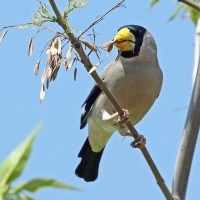 NEW! Wild Japan: Summer In Hokkaido FULL - Check out Japan: Birding & Nature 2025June 18 - 29, 2024
NEW! Wild Japan: Summer In Hokkaido FULL - Check out Japan: Birding & Nature 2025June 18 - 29, 2024 -
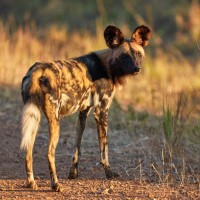 Crossing the Zambezi: A Zambia & Zimbabwe SafariJuly 27 - August 16, 2024, w/Victoria Falls extension
Crossing the Zambezi: A Zambia & Zimbabwe SafariJuly 27 - August 16, 2024, w/Victoria Falls extension -
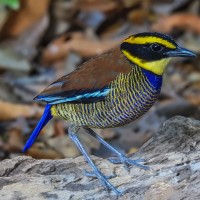 Indonesia's Best BirdingSeptember 11 - 29, 2024, w/Komodo Dragons & Endemic Birds Flores Island extension
Indonesia's Best BirdingSeptember 11 - 29, 2024, w/Komodo Dragons & Endemic Birds Flores Island extension -
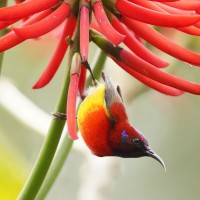 Southern India’s Western Ghats: Global Hotspot for BiodiversityNovember 9 - 23, 2024, w/Andaman Islands extension
Southern India’s Western Ghats: Global Hotspot for BiodiversityNovember 9 - 23, 2024, w/Andaman Islands extension -
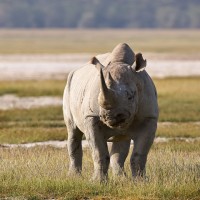 Tanzania: Wildlife & Birding SafariFebruary 11 - 25, 2025
Tanzania: Wildlife & Birding SafariFebruary 11 - 25, 2025 -
 Portugal: Fabulous Birding & CultureApril 2 - 13, 2025
Portugal: Fabulous Birding & CultureApril 2 - 13, 2025
-
Essential Information +
Pace & Protocols +
Packing List +
Suggested Reading List +
Useful Links +
Photo credits: Thumbnails: African Pygmy Kingfisher (NJ Stock), Swallow-tailed Bee-eater (NJ Stock), Squacco Heron (NJ Stock), Green Wood Hoopoe (NJ Stock), Saddle-billed Stork (NJ Stock), Abyssinian Roller (NJ Stock), Abyssinian Ground-Hornbill (NJ Stock), Black Bee-eaters (NJ Stock) Banners: Ghana Crocodile (NJ Stock), Naked-faced Barbet (NJ Stock), Violet Turaco (NJ Stock), Elephant (NJ Stock), Egyptian Plover (NJ Stock), White-necked Rockfowl (NJ Stock)




















